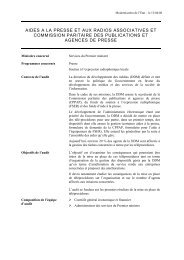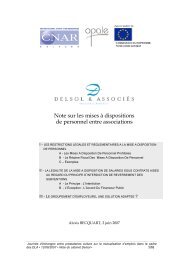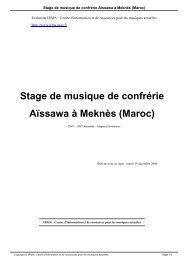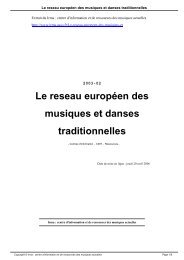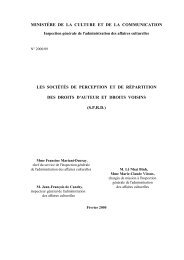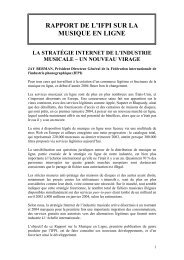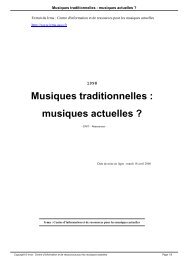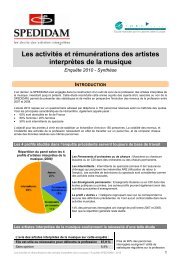Download Piracy Report 2000 - IFPI
Download Piracy Report 2000 - IFPI
Download Piracy Report 2000 - IFPI
You also want an ePaper? Increase the reach of your titles
YUMPU automatically turns print PDFs into web optimized ePapers that Google loves.
Internet <strong>Piracy</strong><br />
Internet piracy spread rapidly in 1999 and early <strong>2000</strong>, but it is too early to quantify the economic impact on the music<br />
market. Online piracy poses exactly the same threat as its physical equivalent to the creativity of artists and the investment of<br />
record producers. Potentially its impact is far greater than physical piracy. Internet piracy hampers the industry’s efforts to give<br />
consumers the benefits of a legitimate online music market. Record companies are making steady progress towards legitimate<br />
online business models, via a string of internet corporate investments and joint ventures, and through the technological forum<br />
of the Secure Digital Music Initiative (SDMI) and DVD-Audio.<br />
<strong>IFPI</strong>’s response to internet piracy is a combination of education of consumers and service providers and, where necessary,<br />
strategic litigation to remove infringing sites. A newly-formed dedicated internet piracy unit is developing a fully automated<br />
search and identification service, jointly with the Motion Picture Association (MPA).<br />
Legislation also plays a vital role in the fight against internet piracy. In the USA the Digital Millennium Copyright Act (DMCA)<br />
was adopted at the end of 1998. In Europe, the Copyright Directive was first proposed in 1997 to allow rights owners<br />
adequate rights and technical controls to protect their works. These legislative measures are the implementation vehicle for the<br />
WIPO Treaties, concluded in December 1996. They provide the legal foundation for the development of a legitimate online<br />
music industry internationally, and need to be ratified in 30 territories worldwide in order to come into force. By early <strong>2000</strong>,<br />
approximately 15 countries in Latin America, Asia, central and eastern Europe, and the US had already ratified the treaties.<br />
On the litigation front, the RIAA in the United States has spearheaded the industry’s response against infringers such as<br />
MyMP3.com and Napster which have tried to build large-scale businesses based on breaching copyright. These actions have<br />
attracted strong support from artists. Internationally, <strong>IFPI</strong> and its national groups have taken action to close down thousands<br />
of pirate sites. A global internet piracy campaign launched in October 1999 drew support from hundreds of artists worldwide.<br />
There have also been successful legal actions against internet service providers (ISPs) and content providers, notably:<br />
Belgium: a court decision against an ISP and against a website operator who offered on his site links to 25,000 illegally<br />
posted sound recordings<br />
France: Criminal litigation against two individuals who operated illegal link sites. This litigation ended with damages of<br />
US$15,000 and suspended prison sentences<br />
China: a settlement between several major record companies and the leading TV portal operator MyWeb which had<br />
provided links to infringing MP3 files. <strong>IFPI</strong> filed a lawsuit against MyWeb in December 1999<br />
Governments in the fight against piracy<br />
Music piracy erodes culture, destabilises legitimate economic<br />
activity and nurtures serious crime. It also robs governments of<br />
hundreds of millions of dollars in unpaid tax revenues and lost<br />
investment. Governments have a key role to play in supporting the<br />
efforts of the music sector and other copyright industries in the<br />
fight against piracy. Legislation and enforcement strategies in<br />
many territories are woefully mismatched<br />
to the scale of today’s international<br />
piracy business.<br />
One in three recordings<br />
worldwide is pirate<br />
36%<br />
Pirate<br />
Sales<br />
64%<br />
Legitimate<br />
Sales<br />
The recording industry’s two key priorities are:<br />
Adequate legislation: <strong>IFPI</strong>’s anti-piracy efforts have shown<br />
that in many jurisdictions intellectual property protection is<br />
inadequate. New legislation is also needed to give governments<br />
tighter controls over the operations of CD plants.<br />
Effective enforcement: in many territories, enforcement<br />
agencies are inadequately resourced and ineffectively managed<br />
to tackle piracy. In particular they are unequal to the global<br />
spread of today’s pirate networks. In many cases, fighting<br />
piracy is given a very low priority and penalties handed out by<br />
courts are often derisory.




